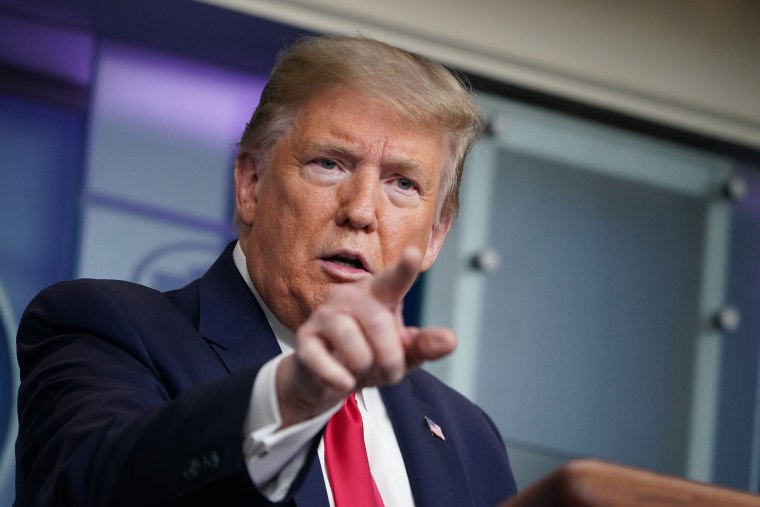For several weeks, Donald Trump was content to pass the buck. Pressed on the deadly pandemic and his administration's obvious missteps, the president famously declared, "I don't take responsibility at all," while shifting the weighty burdens onto state and local officials.
It was a pitiful posture, to be sure, but it served some of the White House's interests. For one thing, it allowed Trump to excuse his own passivity when several Republican governors refused to issue stay-at-home orders. After all, the president said, he believes in "federalism," so governors must be permitted to do as they please.
For another, Trump's position was intended to serve as a political shield: any coronavirus failures should be blamed on governors, the argument went, since he had tasked them with taking the lead.
But then something interesting happened. Two groups of governors -- some on the West coast, some in the Northeast -- decided to fill the vacuum leadership left by the president's indifference and created a pair of regional partnerships that would coordinate on re-opening plans.
It was at roughly this point that Trump started to realize that he'd left himself looking small and weak, so he swung wildly in the opposite direction.
Late yesterday morning, for example, the president published some tweets insisting that the governors who'd issued stay-at-home orders don't actually have authority over what happens next -- because that power is in his hands. He said there are "many good reasons" for this, none of which he identified.
Soon after, during a White House press briefing, Trump went considerably further, telling reporters, "I have the ultimate authority." The president added:
"Let me just tell you very simply. I'm going to put it very simply. The president of the United States has the authority to do what the president has the authority to do, which is very powerful. The president of the United States calls the shots.... When somebody is the president of the United States, the authority is total, and that's the way it's going to be. It's total. It's total. And the governors know that."
As part of the same briefing, he added, in apparent reference to state and local officials, "[T]hey can't do anything without the approval of the president of the United States."
There's no shortage of relevant angles to this, but let's narrow the focus to three key points.
1. This is spectacularly wrong. I realize Trump is the nation's first amateur president and his familiarity with civics is limited, but in our system of government, the idea that the president has "total" authority is at odds with our Constitution, centuries of legal precedent, and the most basic principles of the American experiment. Specifically as it relates to the coronavirus crisis, the idea that Trump has the power to order governors to lift stay-at-home orders, simply at his command, is ridiculous.
2. This is at odds with conservative ideals and Republican principles. I'm trying to imagine what we'd hear from the right if Barack Obama stood at a White House podium and declared he has "the ultimate authority," "total" authority, and the power to direct state and local officials to do as he pleases. I suspect such commentary would be poorly received.
3. This contradicts everything Trump has said for much of 2020. Remember, the president's position was that it was up to governors to lead, while he played a "backup" role. It was the governing model he insisted upon. Just 10 days ago, a reporter asked Trump why he wouldn't even recommend that some of his gubernatorial allies issue statewide stay-at-home orders. He replied, "We have a thing called the Constitution, which I cherish."
Evidently, Trump's interpretation of constitutional law devolved quite a bit over the last week and a half.

